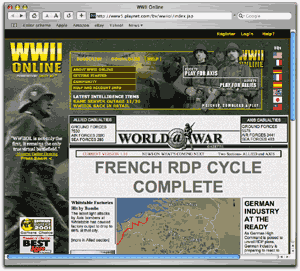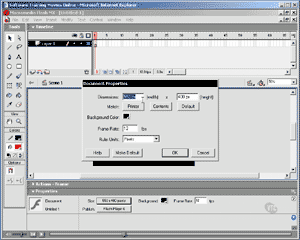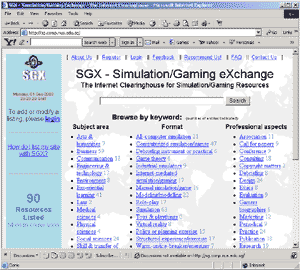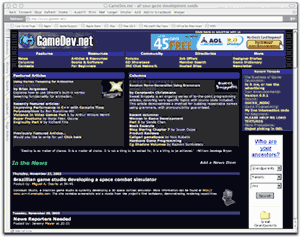WIKI
Submissions
Susan Connell
EDTEC 670
Fall 2003
- Comedy
in Games
- Francois
Dominic Laramee
Based on extensive experience designing electronic games,
Francois Dominic Laramee is a prolific writer and editor
on the subject of game design and development. He has served
as lead designer, producer, programmer or screenwriter for
more than 20 games published for a variety of formats including:
personal computer, Game Boy, interactive television and the
Internet. Ultimate Baseball Online, The Insane Adventures
of Happy McGreed, Steppenwolf: The X-Creatures Project, Arcane
2: The Stone Circle, Arcane: The Online Mystery Serial are
a few of the games to which he has contributed in various
capacities.
With more than a dozen years’ of experience in the
field, Laramee also works as a business process consultant
to game development studios and began working as an instructor
at the school of computer science of Concordia
University in 2002 along with serving as game design
and game history instructor at the National
Animation and Design Center in Montreal.
His published work includes editing and authoring articles
in Game Design Perspectives (Charles River Media, ISBN: 1584500905)
and Secrets of the Game Business (Charles River Media, 1584502827);
writing content for the television game show Wizz, the board
game Cranium: Édition Québécoise and
several trivia web sites; and authoring more than 80 articles,
columns and book chapters about game development for numerous
periodicals and books in both French and English. Subjects
have covered game design elements, writing design treatments
and issues relating to the use of comedy in games, which
ties in to his occasional work as a freelance comedy writer.
TOP
- World
War II Online
 World
War II Online is an elaborate role-playing simulation
game that is classified as a massively multiplayer online
game (MMOG) due to the vast number of players, in the thousands,
worldwide. Like the war it simulates, this game goes on 24
hours a day with real people representing characters in the
British, French and German armed forces. Players have elaborate
missions and command structures and engage on a battlefield
represented by a half-scale map of Europe with accurate terrain
modeling. Players can command and operate a selection of
precisely modeled vehicles, watercraft and aircraft while
using a variety of period weaponry. Virtual uniforms, weapons,
and vehicles were designed with realism in mind and based
on historical data. Each player views the action from a first
person perspective, seeing only what that character would
see. Players can hide in vegetation, seek shelter in abandoned
buildings, sneak up on the enemy, and re-enact most activities
of a real soldier at that time. Each soldier in the game
is controlled by another player, with no computer drones
to alter the course of events or force players into a predetermined
path. Action is determined based on the decisions of the
thousands of players logged on at any given moment - giving
them the chance to change the course of history - in their
virtual world. World
War II Online is an elaborate role-playing simulation
game that is classified as a massively multiplayer online
game (MMOG) due to the vast number of players, in the thousands,
worldwide. Like the war it simulates, this game goes on 24
hours a day with real people representing characters in the
British, French and German armed forces. Players have elaborate
missions and command structures and engage on a battlefield
represented by a half-scale map of Europe with accurate terrain
modeling. Players can command and operate a selection of
precisely modeled vehicles, watercraft and aircraft while
using a variety of period weaponry. Virtual uniforms, weapons,
and vehicles were designed with realism in mind and based
on historical data. Each player views the action from a first
person perspective, seeing only what that character would
see. Players can hide in vegetation, seek shelter in abandoned
buildings, sneak up on the enemy, and re-enact most activities
of a real soldier at that time. Each soldier in the game
is controlled by another player, with no computer drones
to alter the course of events or force players into a predetermined
path. Action is determined based on the decisions of the
thousands of players logged on at any given moment - giving
them the chance to change the course of history - in their
virtual world.
Winner of numerous industry awards including GameSpy's
2001 Gamers' Choice Sim of the Year and IGN's 2001 Persistent
World Game of the Year, World War II Online was launched
in 2001 and has been upgraded numerous times to add features,
enhance realism and increase functionality. The game works
with both Windows and Mac OSX platforms and is available
for $19.95 as a 130MB download or on CD. After a 30-day free
trial, playing the game requires a $12.95 per month subscription
fee.
TOP
- User
Interaction Principles
- Implications
of the Modality Principle in Game Design
Because audio can be somewhat more difficult to implement
in e-learning projects, games and simulations, it is often
overlooked in favor of printed text used to describe on-screen
graphics and animations. However, cognitive theory and research
indicate that, when practical, use of audio narration to
explain a visual presentation enhances understanding and
related problem solving. Specifically, spoken words (audio)
can best be used to describe a graphic or how to use a visual
component rather than simultaneously delivering that graphic
along with the same word in written form. However, when used
gratuitously or redundantly (for self-evident graphics),
audio can actually cause a distraction. In some cases, it
may be advisable to keep verbiage available as an option
in printed form as a memory aid or as an alternative source
for the hearing impaired.
Cognitive research shows that people process pictorial information
in a separate channel from auditory/verbal information. Since
the capacity of each channel is limited, graphics and supporting
onscreen text vie for limited visual bandwidth as the viewer
cannot look at graphics and supporting text simultaneously.
Conversely, when verbal information is presented in audible
form it enters the cognitive system in a different channel
where it can be comfortably processed simultaneously. Tests
have shown that subjects presented with animation and simultaneous
narration generated from 41 to 114 percent more solutions
than those presented with animation and onscreen text - even
though the information presented was identical.
When considering the implications of the modality effect
in game design, it is also necessary to be aware of circumstances
that may impact its application. These circumstances might
include the ability of the hardware to support audio, whether
the environment where the game will be played is appropriate
for audio, budgetary limitations, language limitations and
the hearing ability of the audience.
Reference:
Clark, R.C., and Mayer, R.E. (2003) e-Learning and the
Science of Instruction. San Francisco, CA: Pfeiffer.
Mousavi, S., Low, R., and Sweller, J. (1995) Reducing Cognitive
Load by Mixing Auditory and Visual Presentation Modes. Journal
of Educational Psychology, 87, 319-334.
TOP
- VTC.com
- Software Training for the Creation of Simulations and Games
The Virtual Training Company (VTC.com) produces online and
CD-based training for a wide variety of software in the form
of short, concise QuickTime movies that go step-by-step through
each software application. The movies are designed so that
the viewer can also run the corresponding software and work
along with the movie which can be stopped and started as
necessary to keep the right pace. Each "chapter"
is broken into short, easy-to-digest chunks.
While not strictly a simulation, the tutorials provide a
very flexible, somewhat interactive way to learn a variety
of software programs. More significantly, from a game or
simulation designers perspective, VTC's course catalogue
features training for more than 100 software titles on both
the Macintosh and Windows platforms. Titles include several
versions of Macromedia Flash, Authorware, Cold Fusion, Director
and Dreamweaver; Apple's iMovie, QuickTime VR and Final Cut
Pro; Meta Creations Bryce, Poser and Infini D; Courses are
also available for various programming languages such as
Java, Perl, Visual Basic and C++ and operating systems as
well as productivity and business programs. Additional subjects
include general tutorials about areas such as Sound Editing,
Troubleshooting, Web Publishing, Digital Photography, Scanning
and Color Management.
The company plans to expand their services by adding new
features such as online testing,  training
for newer versions of existing software and more networking
and business software courses. In addition they are developing
K-12 educational training modules covering mathematics, physics,
biology, chemistry and others. training
for newer versions of existing software and more networking
and business software courses. In addition they are developing
K-12 educational training modules covering mathematics, physics,
biology, chemistry and others.
Courses are available on individual CDs with higher resolution
graphics and sound for about $99 each. The online versions
are available on a subscription basis for $25 per month and
the first three chapters for every course are available free
online. The free chapters provide an excellent introduction
to a wide variety of software for initial training or a bit
of try-before-you-buy simulation.
TOP
- Mihaly
Csikszentmihalyi - the Man and the Pronunciation
Csikszentmihalyi (chick-sent-me-high-ee)
"...even without success, creative persons find joy
in a job well done. Learning for its own sake is rewarding..."
 Mihaly
Csikszentmihalyi is best known for his research and writings
on the subject of Flow
- the state where individuals become so absorbed in an activity
that they lose track of time and enjoy the activity for its
own sake. A former professor and psychology department chair
at the University of Chicago, he is currently the Davidson
professor of Management and director of the Quality of Life
Research Center at Claremont
Graduate University. He is also a member of the National
Academy of Education and National Academy of Leisure Sciences.
In addition, he is the author of more than 120 articles and
several books, including: Flow: The Psychology of Optimal
Experience: Good Business: Leadership, Flow, and the Making
of Meaning and Finding Flow: The Psychology of Engagement
With Everyday Life. Mihaly
Csikszentmihalyi is best known for his research and writings
on the subject of Flow
- the state where individuals become so absorbed in an activity
that they lose track of time and enjoy the activity for its
own sake. A former professor and psychology department chair
at the University of Chicago, he is currently the Davidson
professor of Management and director of the Quality of Life
Research Center at Claremont
Graduate University. He is also a member of the National
Academy of Education and National Academy of Leisure Sciences.
In addition, he is the author of more than 120 articles and
several books, including: Flow: The Psychology of Optimal
Experience: Good Business: Leadership, Flow, and the Making
of Meaning and Finding Flow: The Psychology of Engagement
With Everyday Life.
Born in 1935 in Hungary, his worldview was shaped by the
misery he saw all around him as a young boy during World
War II. With this background, he set about in search of positive
alternatives - trying to determine what gave people joy and
satisfaction. His search involved extensive empirical research
starting with artists and creative people. His studies have
extended to include business, sports, games
and education, including work with Montessori educators.
Though not without critics,
his work has been hailed by diverse leaders from former President
Bill Clinton and British Prime Minister Tony Blair to business
executives and even a Dallas Cowboys football coach.
TOP
- Simulation
Gaming Exchange -
Directory with an International Focus
The Simulation/Gaming
Exchange (SGX) is an academic site produced by Honors
and Masters students from the School of Computing at the
National University of Singapore. It serves as an online
clearinghouse for gaming and simulation technology with an
emphasis on education, training and research. The site's
primary audience comprises researchers, university faculty,
school teachers, trainers, modelers and simulation developers.
It is sponsored by Simulation
& Gaming: An International Journal of Theory, Design
and Research, as well as of the International
Simulation and Gaming Association (ISAGA).
 The
site is essentially a user-managed directory that provides
links to simulation and gaming subjects organized and cross
referenced by Subject (as in academic discipline, e.g. Arts,
Engineering, Physical Science, et al), Format (e.g. Role-Playing,
Virtual Reality, Edutainment, etc.) and Professional Aspects,
an area that includes information about associations, calls
for papers, conferences, copyright issues and related issues.
Because of its international focus, it includes links to
a number of sites beyond the commonly referenced North American
resources. The
site is essentially a user-managed directory that provides
links to simulation and gaming subjects organized and cross
referenced by Subject (as in academic discipline, e.g. Arts,
Engineering, Physical Science, et al), Format (e.g. Role-Playing,
Virtual Reality, Edutainment, etc.) and Professional Aspects,
an area that includes information about associations, calls
for papers, conferences, copyright issues and related issues.
Because of its international focus, it includes links to
a number of sites beyond the commonly referenced North American
resources.
SGX allows registered users to list and categorize sites
of interest to the simulation and gaming audience. Registration
is free and registered users can choose to receive updates
when new information is posted.
TOP
- GameDev.net
- Online Resource for Game Developers
Founded in 1999, GameDev.net
has become one of the leading online communities for more
than 250,000 game developers, from the most experienced to
those just starting out. The founders created the site as
a resource where game designers could obtain and freely exchange
information. The site contains news, technical articles,
how-to information, contests, software, a newsletter, forums,
a chat network, job offers, designer diaries, game dictionary
and a special area for beginners. GameDev's staff members
have been  producing
game development sites since 1996 and several staff members
have written books on the subject, but the very active community
of game developers fostered by the site contribute a majority
of the content. producing
game development sites since 1996 and several staff members
have written books on the subject, but the very active community
of game developers fostered by the site contribute a majority
of the content.
Originally conceived as a joint effort by several game development
sites to join forces by interlinking their sites. Ultimately
the founders determined that one cohesive large site would
be more effective and GameDev.net was born. The site has
received numerous awards and recognition and has often been
described as "the best place on the Internet to learn
about game development."
TOP
-
Apple Computer's Involvement in Educational
Games and Simulation
An early proponent of the use of computers and other technology
in education, Apple
Computer has supported extensive research and other initiatives
related to various aspects of instructional technology. Starting
in the mid-1980s, Apple computer funded the Apple Classroom
of Tomorrow (ACOT) to study a cross-section of about a dozen
classrooms in North America and Europe. The goal was to determine
how the use of technology by teachers and students might
change teaching and learning. While the ACOT program concluded
in the late 1990s, it was followed by more broad-based research
efforts undertaken by the Learning Technology Group and participants
in the Apple Learning Interchange. These efforts have focused
on moving beyond the classroom and leveraging the Internet
and a variety of multimedia technologies. "A
Taxonomy of Simulation Software" by Kurt Schmucker,
a Principal Scientist with Apple's Learning Technology Group,
provides a detailed, if somewhat dated, overview of simulation
in an educational context.
Although Apple itself was not a developer of games, the widespread
use of their computers in educational settings, meant that
some of the earliest eLearning games and simulations were
developed for Apple computers including the Apple
II and Macintosh. In the formative years, Apple's consistent
and graphically rich user interface made it easier for students
to focus on the games themselves rather than how to get the
computer to play them and also enabled more realistic simulations
or dynamic game playing. These games have covered a gamut
of disciplines from typing exercises to physics simulations
to role-playing history lessons. While the graphical interface
playing field has largely leveled, Apple's early research
about and promotion of the use of educational games and simulations
contributed greatly to their early and ongoing development.
TOP
Additions
or refinements made to:
TOP |
